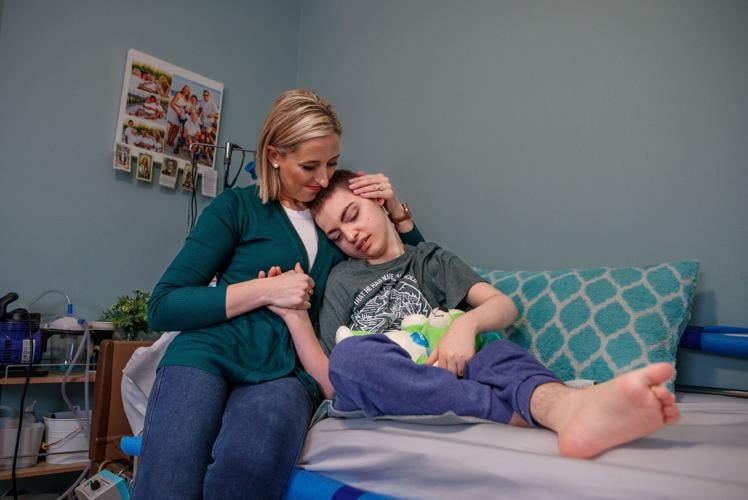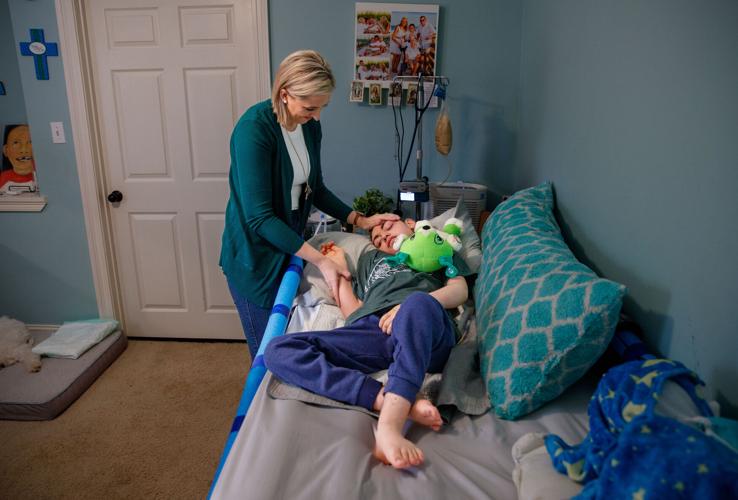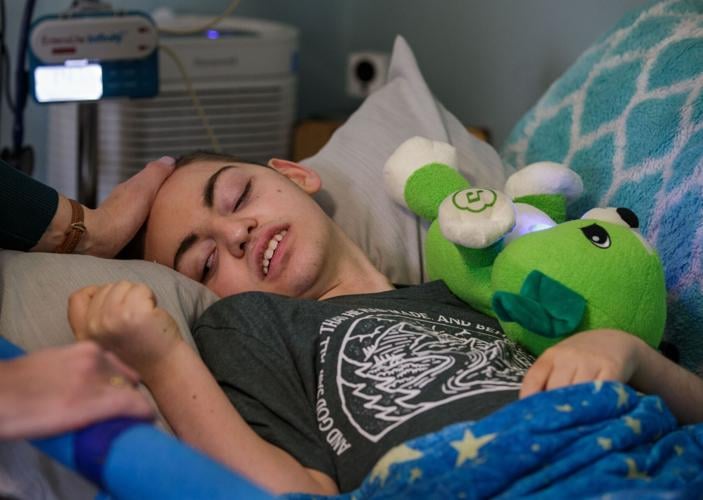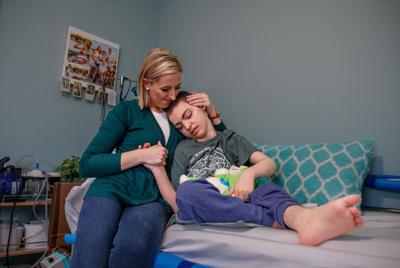Unlike a lot of kids, Connor Corkern is thrilled when it’s time to go to the doctors’ office. Even the car ride, a two-hour drive from his home in Amite to Children’s Hospital New Orleans, is a joyous event for the 15-year-old.
“He just claps his hands and squeals,” said Connor’s mom, Katie Corkern. “And it’s like a pain in my heart to see how excited he is, because I wish he could do that more.”
Before the pandemic, Connor went a lot of places – weekly Mass, where he loved to hear organ music, and his brother’s basketball games, where he clapped from the sidelines as players dribbled down the court. But he’s only been to Mass once in the past two years. Doctors’ appointments have been one of the only times he can leave the house.

Katie Corkern comforts her son, Connor, at their home in Amite, La. Friday, Feb. 4, 2022. Connor is developmentally disabled with an immune condition that means he gets sick very easily. The family takes serious measures to protect Connor from getting sick. (Photo by David Grunfeld, NOLA.com | The Times-Picayune | The New Orleans Advocate)
Connor was born with a rare brain malformation that causes him to be developmentally delayed. He is also on several medications that suppress his immune system in a way that makes it very difficult for him to fight off infection or develop antibodies from vaccines. A cold turns into pneumonia, which leads to a stay in the pediatric ICU – something that’s happened twice over the last few years. He’s managed to avoid infection and other illnesses during the pandemic through isolation, masking by his family and high-tech air ventilation, but it’s been at a cost.
For families like Connor’s, learning to live with COVID is a scary proposition. In combination with Louisiana’s low vaccination rate and resistance in some pockets of the state to mitigation such as masking or limiting gatherings, Connor and his family are on their own to protect him. Hearing someone flippantly chalk up a death to comorbidities is "maddening," said Corkern, because disability doesn't discriminate.

Katie Corkern comforts her son, Connor, at their home in Amite, La. Friday, Feb. 4, 2022. Connor is developmentally disabled with an immune condition that means he gets sick very easily. The family takes serious measures to protect Connor from getting sick. (Photo by David Grunfeld, NOLA.com | The Times-Picayune | The New Orleans Advocate)
"If anything has become clear to me in the past two years, it's that society views the lives of medically fragile people as disposable," said Corkern, who works as a mental health advocate. "People don't think about the consequences of their actions sometimes and how it really does affect their community."
State has large numbers of medically fragile people
A large portion of Louisiana is susceptible to severe illness from COVID-19 because of comorbidities – about 42% of adults, according to an analysis from the Kaiser Family Foundation. But a smaller subset of people have immune systems that don’t respond well to vaccines, such as those with organ transplants or cancer, or dialysis patients and people on certain medications for inflammatory or autoimmune conditions.
It’s estimated that about 2.7% of the U.S. population is immunocompromised. In Louisiana, a state with high rates of cancer and other diseases, that number is about 3% to 5%, according to the Louisiana Department of Health.
Dr. Alfred Luk, medical director of transplant infectious diseases at Tulane University School of Medicine, has been fielding questions from immunocompromised patients who are becoming increasingly frustrated with isolation. They want to know if they can get haircuts, or take a cruise, he said. Their requests are simple, but fraught with potential consequences.
“It’s really hard emotionally to see,” said Luk. “We want them to stay in strong spirits to make it through their treatments, but this is just an awful extra tax on them.”
As a result, those that can have isolated themselves away from friends and family in a way most of the population has not since the early days of the pandemic.
'I do absolutely nothing'
Cathy Cobb, 60, has been hospitalized twice for complications from lupus, an autoimmune condition, since she was diagnosed in 2016. When COVID started, she stayed put, rarely even venturing out for groceries. As a former respiratory therapist, she’s familiar with the damage COVID could cause.
“I kept hanging on and saying, ‘OK, once we get there, we can pick it back up,'” said Cobb, a Shreveport resident. “And now I see I’ll never be able to pick it up like my life was before.”
Most immunocompromised people are told to operate under the assumption that their vaccine doesn’t work. Katherine Macfarlane, a law professor at Southern University, has gotten four COVID shots. But because she takes medications for rheumatoid arthritis that limit her immune system, no one can tell her if they did any good. As a result, she avoids things she used to love: friends, restaurants, travel, going to movies.
"I do absolutely nothing," said Macfarlane. "And as I say that, I'm on the brink of tears, but it's what I have to do and it's what high-risk people have been doing since March 2020."
Immunocompromised people have largely been excluded from clinical trials that measured how well the vaccines work because their immune systems respond differently – if at all – to vaccines.
About 50% of immunocompromised patients have antibodies after two doses of the mRNA vaccines, according to a study from Johns Hopkins University. That’s in part why its recommended that these people have three doses in their first vaccine course and additional fourth dose as a booster. But data is lacking to support how protected they are.
“The sad reality is that they were never really represented, whether it’s treatments or vaccination,” said Luk, the transplant doctor.
Normal is a long way off
But recent attention on immunocompromised people is expanding. After CDC Director Dr. Rochelle Walensky faced backlash when she said it was “really encouraging” that vaccinated people who died of COVID had multiple health problems, a spotlight was thrown onto the group. The disability community rallied after that, said Macfarlane, but it hasn't translated to universal masking.
"I still feel like a forgotten population," said Macfarlane. "I don’t think people know how much we have given up.”
There is a growing effort to better understand the effect of vaccines on people who arguably need them most. Ochsner Health, Louisiana’s largest health system, is enrolling patients in a new trial to track how the COVID vaccine works in immunocompromised people, one of six health care systems in the U.S. to participate in the study. Hospitals in Brazil and Germany are also enrolling patients, hoping for a total of 420 patients worldwide.
“We know this is safe and effective, but we want to be able to understand its effectiveness in a more granular way in people who are living with compromising conditions,” said Dr. Jonathan Hand, section head of transplant infectious diseases, who is overseeing the trial.
Enrollment is open to ages two and over, but only to those who have not yet gotten a vaccine. Participants will receive three doses of the Pfizer vaccine, which is considered the equivalent of the initial two doses recommended for the general population.
But there is still a long way to go. Guidance around COVID vaccines for immunocompromised people has been confusing and counterproductive, the American Medical Association has said.
For example, when the CDC recently changed guidelines for isolation after infection to five days from the original 10, the fine print that said immunocompromised patients should isolate for 20 days was not well publicized, said Hand.
There’s a common phrase Katie Corkern has heard since Connor was born: “Special kids are given to special people.” Before the pandemic, the phrase annoyed her. Now, shopping in grocery stores where people don’t wear masks in a parish where less than half of the population is vaccinated, she feels differently about the phrase.
“I’ve always thought, ‘I’m no more special than anyone else,” Corkern said. “But seeing the way people live their lives … well, it's obvious that not everyone is equipped to care for someone like Connor.”




